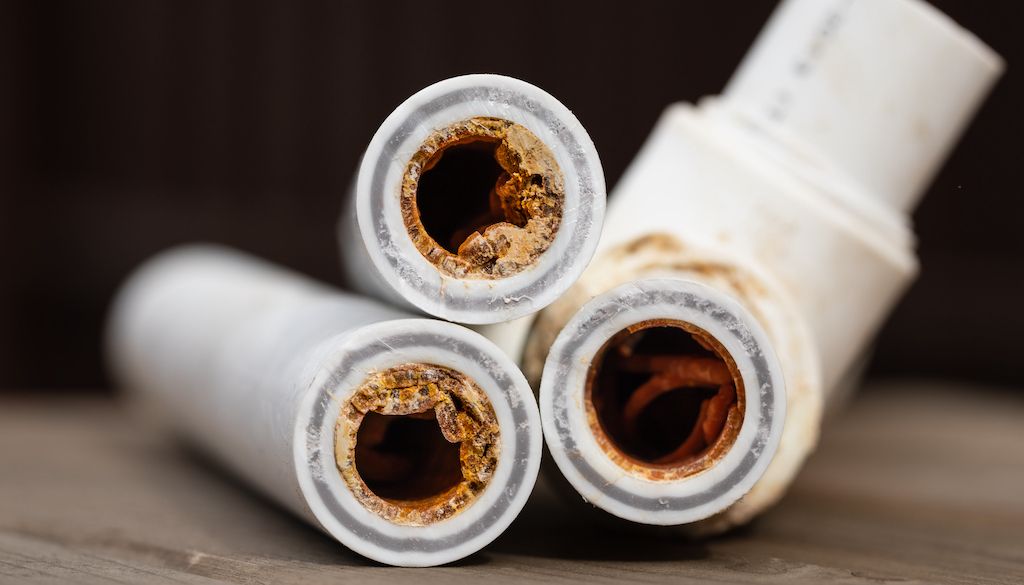What is hard water?
Before tap water reaches your faucet or shower head, the municipality has to collect water from a natural source. Your water utility most likely sources water from a nearby surface or ground water supply. When the utility collects the water, it contains naturally occurring minerals from rocks and soil. The amount of minerals left in the water before it reaches your home determines its hardness.
The United States Department of Energy (“DOE”) defines hard water as water with a high concentration of dissolved minerals. They measure the hardness of water using grains per gallon (“gpg”). The DOE considers water with more than 7.5 gpg to be hard water:
Grains per gallon (gpg) | Water hardness or softness |
0–3 gpg | Soft water |
3.5–7 gpg | Moderate or ideal water |
>7.5 gpg | Hard water (water softener needed) |
You can purchase a water test kit at your local hardware store to identify hard water definitively. The water utility company may also be willing to send you a report detailing the mineral content in your water supply.
Keep in mind that the presence of calcium or magnesium doesn’t necessarily mean the water is hard. The concentration of these minerals has to be above a certain level to affect your home’s plumbing.
6 signs you might have hard water.
Even without having your water tested, there are ways to tell if you have hard water. You may need a water softener if you notice any of these signs:
1. Scale buildup.
You may notice a crusty white substance on your faucets or shower heads if you have hard water. This buildup results from calcium carbonate in your water getting left behind when the water is heated and dries.
Over time, scale buildup can lead to clogs and reduced water pressure. It can also make your heating system less efficient.
2. Dry skin and hair.
Hard water requires more soap to create an effective foam to wash with. The excessive soap needed can dry out your skin and hair. If you notice itchy skin or dry, dull hair after showering, it could be due to hard water. The skin irritation can be especially severe with preexisting skin conditions.
3. Soap scum.
If you have hard water, you may notice it’s difficult to clean dishes and laundry. When the minerals in hard water react with soap, it leaves behind a sticky residue. This soap scum doesn’t dissolve in water, so it'll stick to surfaces even after rinsing.
4. Reduced water flow.
The minerals can build up in the pipes even if you don’t have visible scale buildup on shower heads or faucets. This internal buildup can obstruct your faucet and reduce water flow. Softening your water can improve the flow of water in your home.
Related: How to clean a showerhead using vinegar and baking soda.
5. Stained and faded clothes.
Hard water can prevent your clothes from getting washed properly. The minerals react with soap to make it less effective for cleaning. As a result, laundry detergent will have a harder time removing dirt or stains from clothing in the wash.
Hard water can also make your clothes appear faded, dull and weathered, as well as feel rough and sandpaper-like.
6. Metallic taste or odor.
Hard water sometimes has a metallic taste or smell. This odor can make hard water unpleasant to drink. The high concentration of minerals gives hard water a distinctive taste that can help you identify it.
Effects of hard water.
 Calcium and magnesium are the most common minerals found in hard water. To quickly sum it up, here are the main effects of hard water:
Calcium and magnesium are the most common minerals found in hard water. To quickly sum it up, here are the main effects of hard water:
- Dry hair and skin after showering
- Soap scum and filmy residue on your skin, shower walls and dishes
- Inability to thoroughly clean clothes and dishes
- Scale buildup and deposits that can damage your heating system and other appliances that require water
- Buildup and deposits that can damage pipes, cause blockages and reduce water pressure and flow
How to fix hard water issues.
Installing a water-softening system is the most effective way to fix hard water. Water softeners use an ion exchange process to filter out the positively charged molecules of minerals in hard water. The softener uses negatively charged sodium ions to attract these molecules like a magnet.
If you can’t get a softener right away, you can install an ion exchange filter on your faucet. To remove scale buildup and residue, you can also use vinegar. The acidity dissolves the minerals left behind by hard water.
Hire a plumber near you to install a water softener.
If you’ve noticed signs of hard water in your home, you should consider hiring a professional. With Thumbtack, finding the right plumber to fix your hard water is easy. Download Thumbtack today to get started.
FAQs
What does showering in hard water feel like?
When you shower with hard water, it can feel like you never fully rinse off the soap. The minerals in hard water often leave skin and hair feeling itchy or dry. You may also notice a filmy residue on your skin from these minerals.
Is hard water OK to drink?
Drinking hard water has no adverse health effects. However, the minerals in hard water can give it an unpleasant taste. Installing a water softener can improve the flavor of your tap water and make it easier to drink.